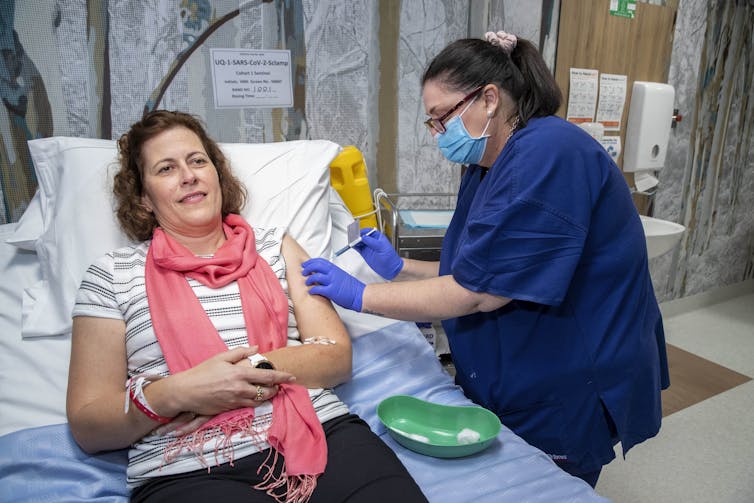Can the government, or my employer, force me to get a COVID-19 vaccine under the law?
- Written by Maria O'Sullivan, Senior Lecturer, Faculty of Law, and Deputy Director, Castan Centre for Human Rights Law, Monash University
Prime Minister Scott Morrison took many people by surprise this week when he said a COVID-19 vaccine would be “as mandatory as you could possibly make it”.
Although he later backtracked on the use of the word “mandatory”, he made clear the government is aiming for a 95% vaccination rate in Australia.
There appears to be strong community support for the vaccine, but it is not yet clear there will be enough people willing to take it voluntarily to reach that target. Therefore, it is likely there will have to be some sort of incentive or compulsion by the government to ensure nationwide compliance.
What, then, are the legal limits to compelling people to be vaccinated? There are myriad questions that could be raised, such as:
can workplaces require that workers take the vaccination as a condition of employment?
can airlines require an immunisation certificate to permit people to travel?
should people be able to claim a non-medical exemption, such as a conscientious objection to vaccines or on religious grounds?
This is an important debate we need to have about how to balance the rights of the community versus those of the individual in a public health emergency and how the law should be used to ensure the efficacy of a COVID-19 vaccine.
Can the government mandate vaccinations?
The right to bodily integrity is a fundamental legal principle in Australia. This means a person cannot be subject to medical treatment without consent.
However, there are exceptions to this under state and territory public health laws. For instance, sections 116 and 117 of the Victorian Public Health Act permit public health orders to compel people to undergo a medical examination, testing and treatment without consent if it is required to address a public health issue.
There may be a legal argument here that a vaccination is not “treatment”. But that could be dealt with via an amendment to the legislation.
Can workplaces and businesses require vaccines?
There is a strong case for requiring particular workers (for example, those in aged care facilities) to be subject to mandatory vaccinations. However, many other workplaces in Australia may also require COVID-19 vaccination certificates under Occupational Health and Safety policies.
The legal dynamics here are different to a government-mandated vaccination if it is required as a condition of employment (which is a private law matter).
There is precedent for this: some states and territories have adopted a mandatory vaccination policy for staff working in close contact with patients or infectious materials. In the ACT, for example, all ACT Health staff are subject to an “occupational assessment, screening and vaccination procedure”, which requires them to be immunised against diseases including influenza, diphtheria and hepatitis B.
 A potential COVID-19 vaccine has shown positive results during phase one human trials in Adelaide.
DAVID MARIUZ/AAP
A potential COVID-19 vaccine has shown positive results during phase one human trials in Adelaide.
DAVID MARIUZ/AAP
Similarly, businesses could require an immunisation card to be presented as a condition of entry. This could include airlines requiring proof of vaccination as evidence of “fitness to fly”.
There are more complex legal questions when it comes to requiring vaccines for students to be admitted to schools or universities.
This was hotly debated in those states that introduced a “no jab, no play” mandatory vaccination regime for access to child care services, as well as the federal “no jab, no pay” policy.
Despite differing rules around the country, all states and territories have fairly consistent rates for childhood vaccinations — with a nationwide coverage rate of 91%. Whether the same rate could be reached for a COVID-19 vaccine remains to be seen.
Would this infringe on people’s human rights?
Challenges could be made to any compulsory COVID-19 vaccination policy under the human rights charters in Victoria, Queensland and the ACT, which aim to protect rights such as freedom of expression, thought, conscience, religion and belief.
Here, much will depend on who is requiring the vaccination (a public body or private business) and whether there are punitive measures in place for non-compliance (for example, the use of fines or imprisonment).
If there are punitive measures for non-compliance, these may be deemed as disproportionate by a court — even if it could be argued compulsory vaccines are necessary and reasonable for public health reasons.
The use of compulsory vaccination programs also has specific implications for children’s rights. The UN Convention on the Rights of the Child provides that every child has the right to “the enjoyment of the highest attainable standard of health”.
However, children also have the right to an education. Therefore, punitive measures to compel parents to vaccinate their children against COVID-19, such as keeping them out of school, could violate the core principles of this convention.
Can people argue for a vaccine exemption?
There is no recognised right to conscientious objection to vaccinations under Australian law. Therefore, any person who is not willing to be vaccinated cannot merely argue an “objection” to it.
A religious body, however, may be able to argue a federal compulsory vaccination policy interferes with the freedom of religion protections under the Australian constitution, but that is a complex legal question.
One religious group did successfully claim an exemption to mandatory childhood immunisations — the Christian Scientists. This “conscientious objection” exemption was removed in 2016, but it does provide an example of how such an exemption could be dealt with under the law.
 The federal government has invested $5 million in the University of Queensland’s COVID-19 vaccine development.
Glenn Hunt/AAP
The federal government has invested $5 million in the University of Queensland’s COVID-19 vaccine development.
Glenn Hunt/AAP
How to create good law during a crisis
Governments clearly have an obligation to protect the public’s health and welfare and vaccinations are an important means of ensuring this.
But while punitive legal measures such as fines may be effective in compulsory mask usage, they are not necessarily going to be effective when it comes to something much more invasive like a vaccine.
Serious thought must not be given just to what the law can do to achieve a high COVID-19 vaccination rate, but also what good law is. That is, we must pursue measures that will be sufficiently accepted by the community.
Authors: Maria O'Sullivan, Senior Lecturer, Faculty of Law, and Deputy Director, Castan Centre for Human Rights Law, Monash University



















